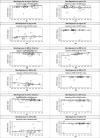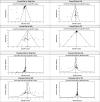Effect of CPAP treatment for obstructive sleep apnea hypopnea syndrome on lipid profile: a meta-regression analysis
- PMID: 25325596
- PMCID: PMC4237522
- DOI: 10.5664/jcsm.4282
Effect of CPAP treatment for obstructive sleep apnea hypopnea syndrome on lipid profile: a meta-regression analysis
Abstract
Study objective: Patients with obstructive sleep apnea (OSA) frequently exhibit higher rates of dyslipidemia, a risk factor for cardiovascular and cerebrovascular disorders. Treatment for OSA by CPAP may improve cholesterol metabolism. This meta-regression analysis (MA) estimates the effect of CPAP treatment on dyslipidemia.
Methods: PubMed and Cochrane libraries were searched by utilizing different combinations of keywords: CPAP, obstructive sleep apnea, serum lipids, dyslipidemia, cholesterol, total cholesterol (TC), low density lipoprotein, LDL, high density lipoprotein, HDL, triglyceride, and TG. Inclusion criteria were: (1) English articles and (2) studies with an adult population with the diagnosis of OSA who were treated with CPAP. The OSA group must have cholesterol profile including TC, LDLc, HDLc, and TG, without and with CPAP treatment. Fifty-four studies were reviewed, while 29 studies pooled for MA.
Results: Thirty-four datasets from 29 studies with 1,958 subjects pooled. Treatment duration range was from 2 days to 1 year. TC standardized mean differences (SMD) ranged from -41.5 to -0.077, pooled mean difference (PMD) was -5.660 (LL -6.715 to UL -4.606, p < 0.001). SMD in LDL ranged from -3.7 to 0; PMD was -0.488 (LL -0.715 to UL -0.261, p < 0.001). HDL SMD ranged from -0.498 to 1.94. The PMD was 0.207 (LL 0.05 to UL 0.364, p < 0.01). TG SMD ranged from -9.327 to 1.98; PMD was -0.054 (LL -0.124 to UL 0.016, p < 0.129).
Conclusions: CPAP treatment for OSA seems to improve dyslipidemia (decrease in total cholesterol and LDL, and increase in HDL). It does not appear to affect TG levels.
Keywords: CPAP; cholesterol; dyslipidemia; obstructive sleep apnea; sleep disordered breathing.
© 2014 American Academy of Sleep Medicine.
Figures






References
-
- Young T, Evans L, Finn L, Palta M. Estimation of the clinically diagnosed proportion of sleep apnea syndrome in middle-aged men and women. Sleep. 1997;20:705–6. - PubMed
-
- Lavie P, Lavie L. Cardiovascular morbidity and mortality in obstructive sleep apnea. Curr Pharm Des. 2008;14:3466–73. - PubMed
-
- Nieto FJ, Young TB, Lind BK, et al. Association of sleep-disordered breathing, sleep apnea, and hypertension in a large community-based study. Sleep Heart Health Study. JAMA. 2000;283:1829–36. - PubMed
-
- Peppard PE, Young T, Palta M, Skatrud J. Prospective study of the association between sleep-disordered breathing and hypertension. N Engl J Med. 2000;342:1378–84. - PubMed
-
- Shahar E, Whitney CW, Redline S, et al. Sleep-disordered breathing and cardiovascular disease: cross-sectional results of the Sleep Heart Health Study. Am J Respir Crit Care Med. 2001;163:19–25. - PubMed
Publication types
MeSH terms
Substances
LinkOut - more resources
Full Text Sources
Other Literature Sources
Miscellaneous

